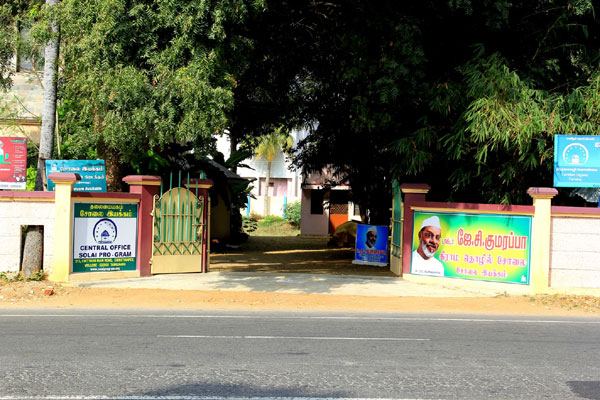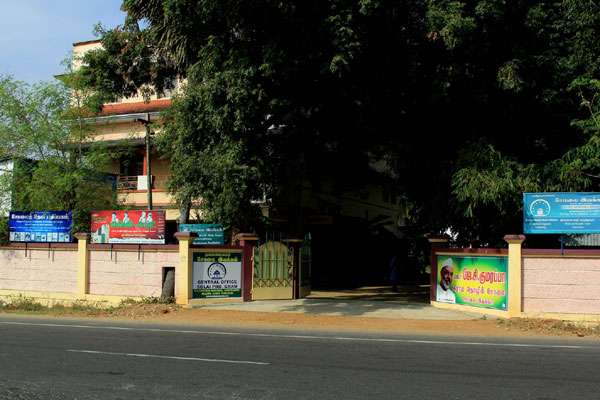
Quick Enquiry
About Us
 |
 |
Social Life Animation India (SOLAI) movement is the result of a dream to realise its mission, born out of learnings in different social movements. The underlying philosophy of its programme is:
"Let us nurture the human in every person
Protect and Preserve Mother Earth
With in the feminine, the human is not nurtured
Nurturing is empowering; and enriching feminism"
R.T.Rajan, the Founder of SOLAI movement worked in the Boodhan movement
with Acharya Vinoba Bhave as a volunteer in the years 1956/57. Later he
involved in the Periyar EVR's Self Respect movement and contributed
articles to the revolutionary Poet Barathidasan's "Kuyil" weekly in
1959. The impact of the movements inculcated in him the ideals of
Gandhiji, Tolstoy and the great reformer EVR. As a versatile writer he
has contributed articles to a number of magazines on social themes. He
expressed his views about 'Respect and reverence of Life and Earth in
the magazine entitled "Kootturavu" in the section 'Lo, my younger
sister' (Thangaikku) every month from 1958-67.
After 25 years of experience in rural Development experiments of
Gandhigram, Marthandam YMCA and RUHSA of Christian Medical college &
Hospital Vellore, which enriched him with the thoughts of Gandhian
economist Dr. J.C.Kumarappa, Dr. Spencer Hatch and Dr. Margaret Sanger,
he felt strongly to start a movement called Social Life Animation India
(SOLAI) in the year 1981. 'Solai' means, in Tamil, Grove or Green
prosperity.
 |
Vision
Custodian culture and Leadership among peoples in various Biotic regions to have Rightful, livable and sustainable environment for Life on Earth.
Mission
Initiating strategic efforts to invigorate the living conditions of the excluded sections and the resource poor in the rural communities like poor women, former Primitive Tribals, small fac users pastoralist and the Natural Resource Dependent Marginalized Producer groups
Approach
Focusing eco-based economic empowerment of the above said groups by initiating measures to protect and promote the Natural livelihood resources through inclusive social Entrepreneurship interventions enriched with localized best ethno practices and appropriate sustainable technologies.
Phase I: (1981-1983) as an unregistered entity...
Building Animators movement in South India.
During this period the major focus was to build Animators movement in the communities. In the initial stages it was to identify like minded grass root level organisations and Groups and conduct programmes for Animators and mid level leaders to encourage and equip them. The thrust was on leadership training for community organisation and community based Health and Development. About 200 action groups, social service societies and Gandhian organisations in southern states of India were helped by these training programmes.
Promoting community based Health action in Asia
In 1982, SOLAI had played a major role in formulating and conducting
a two months course on community based health sponsored by the Asian
Health Institute, Japan at Deenabandu, India for the NGO's leaders of
South Asian countries. Again at the request of Asian Health Institute,
SOLAI had deputed its Director to conduct a two months International
course on community Based Health at Nagoya, Japan as its Programme
Director.
In 1983 SOLAI was invited to Nepal as a Resource organization to conduct
a workshop on community Based Health for the Nepal NGOs at Anandban. In
the same year SOLAI was involved in the international workshops on
community Health organized by ACHAN (Asian community Health Action
Network) and Dialogue Group. It was actively involved in a series of
planning sessions by the CHAI (Catholic Hospitals Association of India)
for strategizing community Health Programmes of its 2000 member
institutions.
Evaluation of Green Economic Empowerment Programme:
At the request of Salem Social service Society, SOLAI undertook an evaluative study on their District level community based Livestock programme in Dharmapuri District. The study was published by the Society.
Using Mass media for Development:
As a tool for information-Education and communication for the community based cadres and the NGOs in Tamilnadu State SOLAI had started publishing a registered Tamil monthly titled "Barathi Solai" in 1983.
Phase II Registered Society - (1984-1986)
Solai was registered in 1984 as SOLAI PRO-GRAM under the Societies
Registration Act. To meet the need and demand for Training in NGO sector
SOLAI had to concentrate on the spot training and advisory
services till 1986.
Further a Resource centre for knowledge Transfer in People's Language
was started with the support of Tamil writers and published resource
books on various aspects of Development. To strengthen and sensitize the
writers of popular magazines on Developmental and environmental issues,
a series of 10 sensitizing programmes at various Dist. Head quarters
covering entire Tamilnadu State and a concluding State level workshop
were organised. Consequently Tamilnadu writers Uravu (Movement of
writers for People's Development) was formed.
Phase III 1987-2005
Community-based Programmes and Research cum Action Projects on Life
enriching Ethno practices:
During this period the emphasis was on the grass root level programmes in Vellore District, Tamilnadu. The major programmes implemented in partnership with other NGOs, Agri and Veterinary Universities Govt. Depts., and Banks are listed below:
- Holistic Development comprising Liberative efforts, Economic Development, Health Development, Agri. Development and Environmental care with rural women leadership in two Blocks.
- Capacity building programme in Nature based Technologies.
- Water and Sanitation Programme in Eight Blocks.
- Community based Rehabilitation Programme and Home based community level care giving to the mentally challenged children in one Block.
- Siddha-Ayurveda and Naturopathy integrated community based Health action in two blocks.
Studies & Publications:
- Ethno pharmacology and People based Health care
- Ethno Veterinary practices
- Bio diversity and Ethno pharmacology
- Ethno forms of communication in Development Education
- Human Rights, Minority Rights and Development
- Published 55 titles on Environmental care and Development, in Tamil
Phase IV - 2006 onwards...
Paradigm shift
In the context of endangered environment and endangered quality of life, SOLAI's priorities and focus have been shifted and started focusing on the activities for the protection and promotion of Natural living resources and the most vulnerable Nature dependent poor communities.
The effects of the efforts of SOLAI in the past two decades towards Awareness building on environmental sustainability and capacity building in Eco- promotive income generating activities have broadened the public support towards Green livelihood and increased the self and wage employment opportunites in Green sector. As a priority measure, SOLAI is now facilitating to develop a Living Link with working class identity, cutting across caste barrier, among the Traditionally self employed Natural Resource dependent communities in the sectors ie., Forestry, Farming etc., as a platform to voice their protest against the existing 'Taming strategies and resulting oppression from the "Power structures" and to assert their rights for peaceful and decent living.
Ongoing major initiatives for Inclusive development and Social harmony
- Working with poverty ridden agricultural task force and other food raisers like Women farmers, small land holders, pastoralists and Natural Resource dependent traditionally self employed informal worker groups for Poverty reduction and Nature conservation.
- Developing Women (farmers) Integrated Social- Entrepreneurship (WISE) models for Green livelihood and Green employment.
- Promoting Organic farming and organic products for Healthy food and environment
- Providing Indigenous Green health care services through advanced “Siddha Ayurveda & Nature” (SAN) Health center, clinics-Panchakarma centres
- Formulating Natural drugs, conducting research on Siddha/Ayurveda medicines and Ethnopharmacological herbal formulations.
- Developing Prototypes and producing value added Basic Nutritive Food supplements for Nutritional deficiencies and disorders by using local minor crops and Farm residues.
- Disseminating needed information and technologies among resource poor workers of Informal Green economy.
- Strengthening cultural components by conducting ethno Field studies, publishing research publications and print products and promoting integration of best ethno practices with development interventions.
- Promoting Barrier free spirituality as generator for social harmony and social development.


